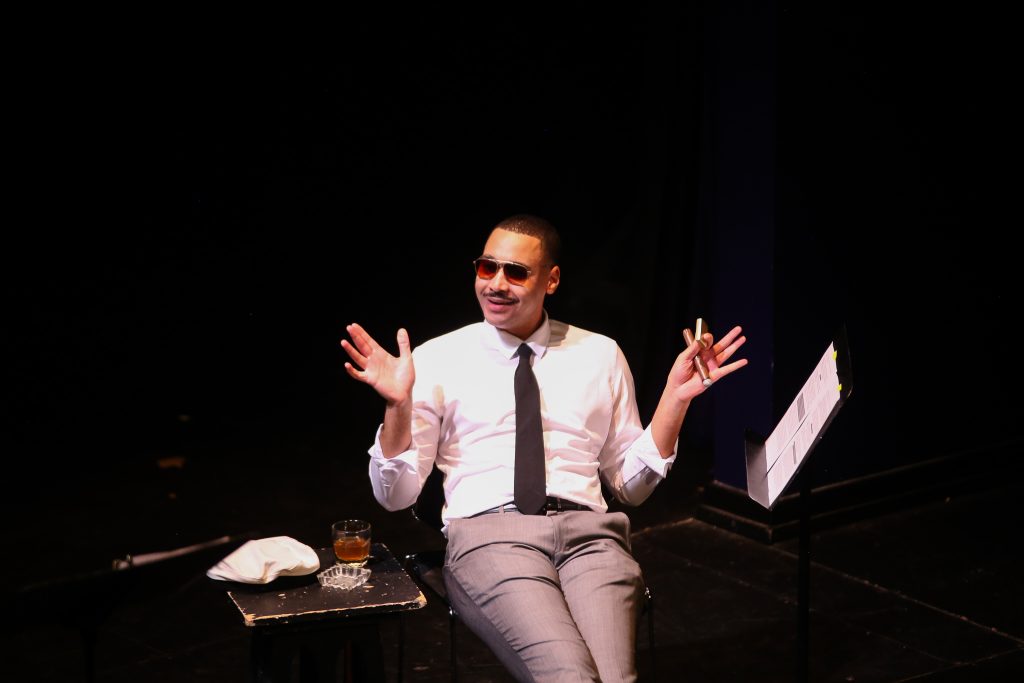The Africana studies department presented “Powell: The Life and Legend of Adam Clayton Powell Jr.” this Thursday evening in Studio B of the Anderson Center, in honor of the department’s 55th anniversary.
“Powell” — a one-man show — follows the life of Adam Clayton Powell Jr., highlighting his humanity, along with his notable accomplishments. Powell was the first Black person elected to Congress from New York and a pastor at the Abyssinian Baptist Church. Although Powell earned tremendous political power throughout his life and career, the play highlighted that his true power lay in his humanity.
The performance opened with Powell addressing the audience, recapping his divine mission, heritage and life. He passionately spoke about his late sister, Blanche. As he held her tear-soaked scarf in his hands and placed it on the ground, he explained the guilt he felt over her death.
When Blanche died, Powell lost belief in God. He had a scandalous reputation as a playboy, who used women and partying to forget his pain. One night, when he was a senior at Colgate University, he heard a voice, which he believed was God calling out to him. From this, he decided to become a minister.
“Powell” touched on Powell’s own narrative, rather than his reputation. Brandon Wright, the director and an assistant professor of theatre, described what drew him to the production.
“So often we hear about historical black figures, rarely do we get to hear from them,” Wright wrote in an email. “I was drawn to the personalization of this story against ACP’s public and colorful reputation. I was excited for him to speak from his own voice.”
One night, Powell heard a knock at his door. It was five physicians from Harlem Hospital, in search of Powell’s help to desegregate Harlem Hospital. Powell led Black activists in nonviolent peaceful protest. He believed their anger should empower their peaceful protest and cooperation with allies in their fight for freedom.
As the first Black congressman from New York. His amendment, the Powell Amendment, denied federal funding to any institution that engaged in racial segregation or discrimination.
“Our socio-political climate certainly (and unfortunately) mirrors much of what Adam experienced and talks about in this play,” Wright wrote. “Our audiences will be able to see those parallels in a way that, hopefully, calls us to action. I think the play will also allow contemporary audiences to embrace a path to greatness that is less conventional. Powell is sometimes overshadowed by the other leaders of his time. He is proof that you don’t have to be the loudest or most recognized person in the room to make positive change.”
Powell believed that civil rights was not only Black people’s salvation but America’s salvation. He pointed out the hypocrisy within the U.S. government and throughout the country and believed America was divided, rather than united.
Energized by his victories and the love he had for his people, Powell held a strong belief that Black power was on the rise. Later in his career, he was accused of embezzlement without any sound evidence and was prosecuted. Powell believed that when he was attacked, Black representation was attacked. When his career ended, he preached that Black people in America should not stop the fight for freedom and that they had the right to exercise their power.
“The most important theme in the play is the humanization of greatness,” Wright wrote. “So often we think of leaders and changemakers as people who are perfect and possessing qualities that seem hard or impossible to achieve. Adam Clayton Powell teaches us that we can achieve greatness in the face of our humanity.”



